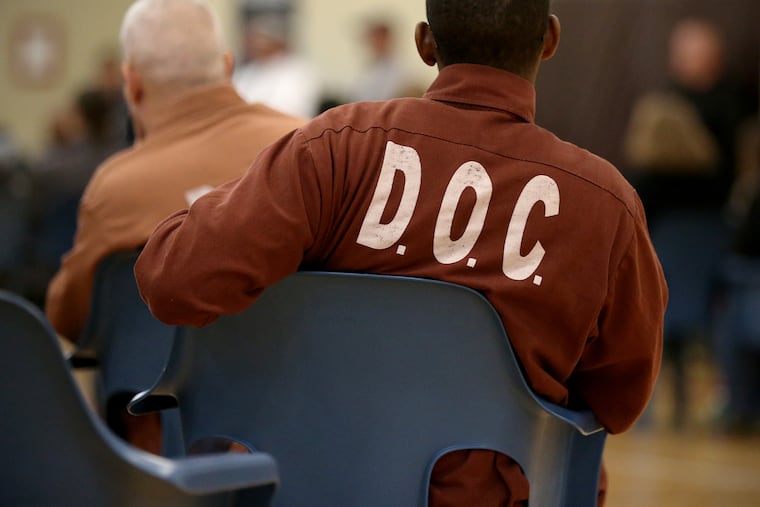Pennsylvania law has 5 times more crimes than in the ’70s. Is that one reason Pa. has 5 times more prisoners?
“Cruelty to animals” is already a crime. So is it necessary to tack on “cruelty to cow to enhance appearance of udder?”

In Philadelphia, a gun-possession charge is never just a gun-possession charge.
Usually, it’s at least two or three different charges piled on top of one another: Carrying a firearm without a license; carrying firearms on public streets or public property in Philadelphia; and, when fitting, carrying by persons not to possess, use, manufacture, control, sell, or transfer firearms. Stacked consecutively, those would carry up to 22 years in prison.
According to a new analysis from the ACLU of Pennsylvania, such repetition is rampant these days across the Pennsylvania crimes code, from the lowest-level misdemeanors all the way up to the most serious felonies. (For instance, “cruelty to animals” is already a crime. So is it necessary to tack on “cruelty to cow to enhance appearance of udder”? And why did lawmakers recently propose a ban on “setting fire to one’s own home” when arson is already illegal?)
The ACLU’s criminal justice policy counsel, Nyssa Taylor, who wrote the report, said the code was both succinct and comprehensive when it was introduced with 282 offenses and suboffenses in 1972. But that number rose to 636 in 2010, and from there to 1,500 in 2019. And, she said, sentences have grown far harsher in that time.
“Legislators want to do something,” she said. “It’s seen as doing something, but what it’s actually doing is degrading and destroying our crimes code.”
The trend has accelerated since Paul Robinson, a University of Pennsylvania professor, wrote in 2009 that an “average of 22 per year [new crimes are added] to the Crimes Code and an additional 41 annual new crimes” are added outside the crimes code.
Taylor said it’s not a coincidence that the state prison population also has grown since 1972, from a little more than 5,000 prisoners to 48,000 today. (By comparison, Pennsylvania’s population grew less than 10% in that time frame.)
Pennsylvania House Judiciary Committee Chairman Rep. Rob Kauffman, a Franklin County Republican, acknowledged that the crimes code expanded but said that expansion reflects a legislature responding to evolving demands.
“You look at cyber crimes. Cyber crimes never factored into our criminal-justice system before,” so the legislature had to address that, he said. “Or, for instance, human trafficking. Is that new? Or is it finally just being recognized as a crime?”
Among offenses proposed in the last legislative session were: harming a service guide dog; evading arrest on foot; leaving a child under 13 in a car without supervision; sale of novelty lighters; threat to commit violence against a school. The ACLU argues these offenses are already well-covered by existing laws on animal cruelty, resisting arrest, reckless endangerment, risking catastrophe, and terroristic threats.
Kauffman said that every addition to the crime code represented a real area of ambiguity for the courts.
“There are often what many of us perceive as criminal acts, but a judge will say, ‘I don’t think that qualifies,' " he said. “I guarantee you lawmakers in Harrisburg are not sitting around saying, ‘What new crime can we come up with today?’ These are being brought to us by our constituents, our law enforcement, our victim advocates. ... These are a response to what the people of Pennsylvania ask of our lawmakers.”
But these additions of more and overlapping charges are not harmless, Taylor said: The legislature also is stripping power from judges and handing it to police and prosecutors.
“It creates this huge buffet of charges for prosecutors to pile on in order to coerce guilty pleas,” she said. “It’s a lot easier to convince people to take a guilty plea if they’re facing all of that time.”
To Taylor, this is straightforward to fix. What lawmakers would need to do is streamline the current code, and then require an “existing crimes comparison statement” on new crimes going forward. (Kauffman said that analysis is already being done on each and every bill proposed.)
Lindsay Vaughan, executive director of the Pennsylvania District Attorneys Association, which has supported tougher sentencing including restoration of mandatory minimum sentences, said she could not comment because she had not received the report.
This shift has come at a time when the General Assembly is introducing 20% fewer laws each session than it did in the 1990s. It’s passing fewer laws than in the past, while introducing more and more ceremonial resolutions, a recent analysis by Spotlight PA found.
Yet the ACLU notes that laws passed recently — by both Republicans and Democrats — have criminalized more and more behaviors. Among recent additions to the criminal code are pretending you need a service animal, impersonating a veteran, demonstrating at a funeral, and damaging a land marker.
“There are all these offenses that Pennsylvanians would probably not think worthy of criminal punishment,” Taylor said. “Pretending your dog is a service animal? I’m not sure you’re going to get too many people who are saying, ‘Yes, that should definitely be a misdemeanor.’ ”